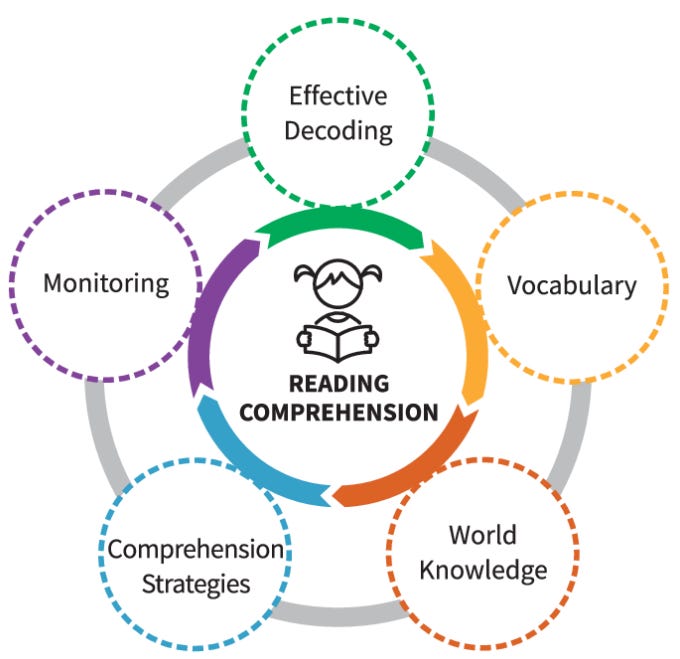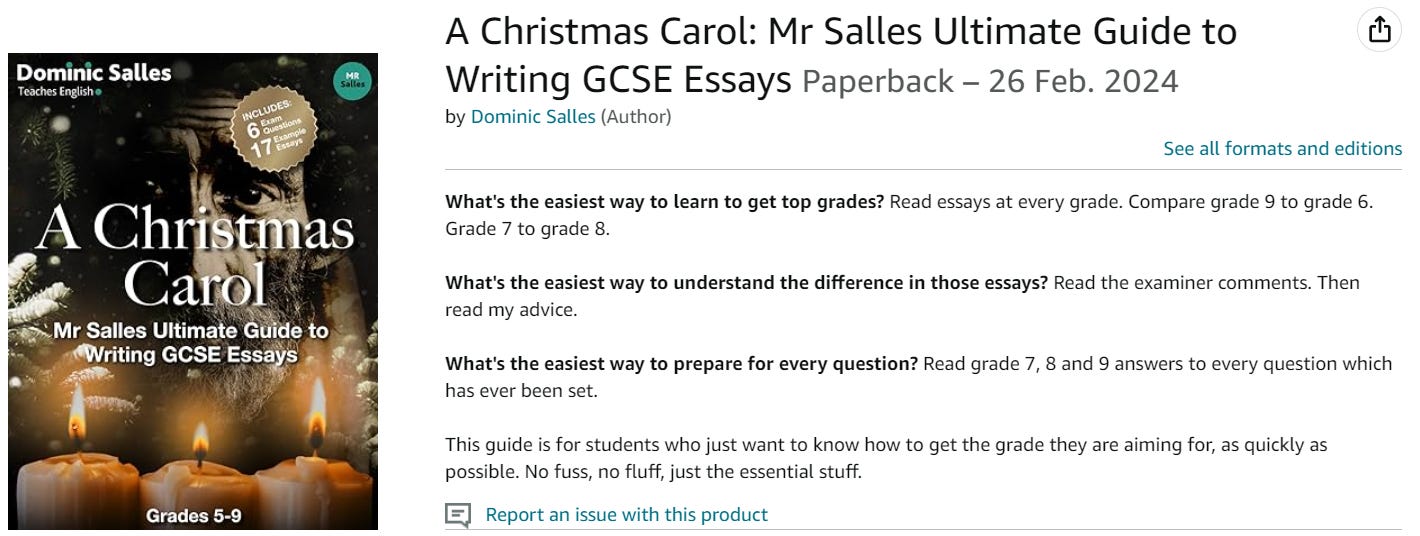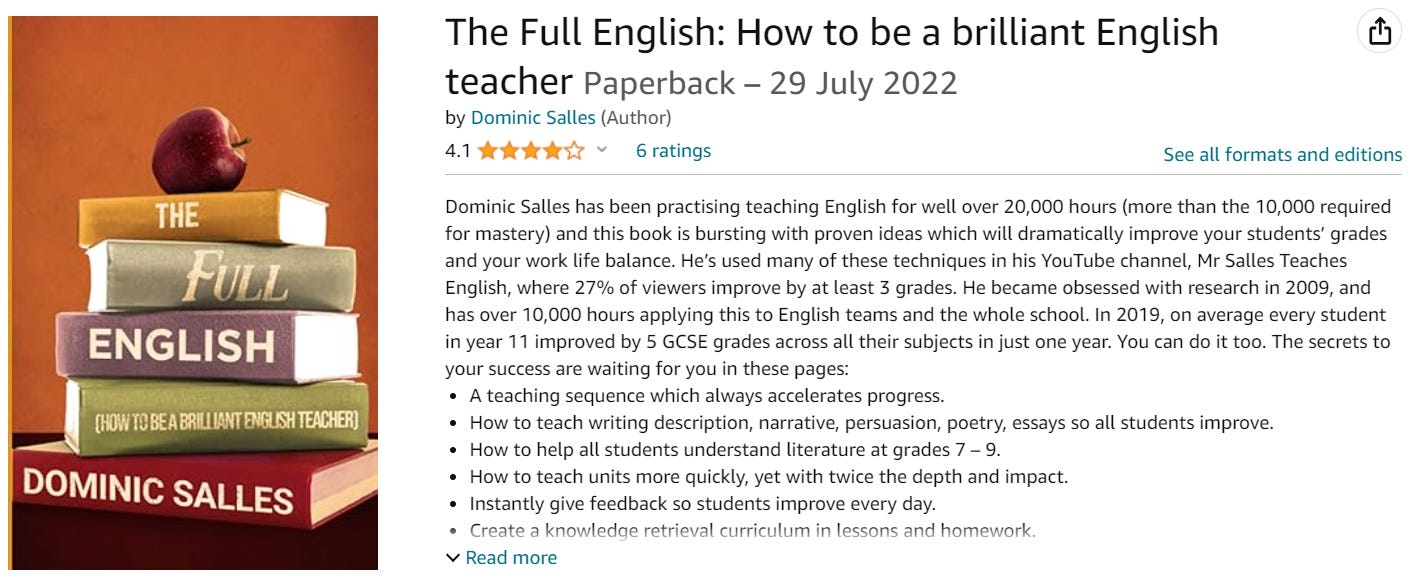How to Teach Reading Comprehension
Ed. Hirsch
Most vocabulary instruction I see in schools is both ineffective and a massive opportunity cost. I’m not basing this on personal observation alone, but on the summaries of the research into reading by Ed. Hirsch. You can read his paper here.
The 30 minutes a week you spend on teaching a handful of words will have a much lower impact than 30 minutes a week reading high quality texts.
For example, you might read 2 Greek myths a week in that time, which won’t just massively boost vocabulary, but cultural capital, historical understanding and the foundational allusions of a huge number of texts they will meet in the future.
Departments which teach specific vocabulary rarely construct any sort of assessment which examines the effect of this teaching. Does it lead to long term memory? Do students suddenly become adept at using these words?
How do you even choose the best words to study?
But wait, what am I doing - this is supposed to be about comprehension. This is exactly the problem. We are so conditioned to treating comprehension as entirely a vocabulary problem in schools.
This is both wrong and a recipe for very boring vocabulary lessons which, incidentally, don’t work.
So, let’s go back to Ed Hirsch, the expert on vocabulary acquisition and reading comprehension, to see how we can create a powerful vocabulary and comprehension curriculum.
I’ve asked ChatGPT to summarise each section of Hirsch’s paper, and then apply it to a part of the English curriculum to show you some quick examples of how you can use the research, and play around with AI to save you time and give you unexpected solutions.
My notes are in italics.
Instructions for Teachers: Improving Reading Comprehension
Prioritize Fluency in Reading:
Emphasize the development of reading fluency.
Help students read smoothly and quickly to enhance their ability to focus on comprehension. (Research shows this means students rereading the same text out loud).
Expand Vocabulary Skills:
Integrate activities that promote the acquisition of a wide range of vocabulary. (This does not mean the learning of definitions of tier 2 vocabulary, or students writing sentences to include these tier 2 words)
Recognize the connection between vocabulary breadth and improved comprehension.
Emphasize Domain Knowledge:
Highlight the importance of domain-specific knowledge in enhancing reading skills.
Encourage students to build expertise in various subjects to boost fluency, vocabulary, and deeper comprehension. (This might mean reading non fiction texts, or essays relating to the text you are studying - these pack much more information into a short number of words. For example, 7 essays on Macbeth, each of 1000 words, would give students the subject knowledge to fully understand every character, theme and significant quotation. It would also teach them every vocabulary choice they would need to write about the play. How long does it take to study 7000 words?)
Integrate Cognitive Science Insights:
Stay informed about advancements in cognitive science and psycholinguistics.
Apply research findings to refine teaching methods for better student achievement.
Encourage Active Engagement:
Foster interactive discussions and activities that engage students in critical thinking.
Create an environment that encourages students to actively participate in building their comprehension skills. (Gap fills/Cloze tests are the easiest ways for students to think hard about language choice. Spend some time thinking how to enjoy comprehension tasks and you can transform your lessons).
Acknowledge the Complexity of Reading Comprehension:
Recognize that understanding the nature of text comprehension is an ongoing challenge.
Be open to adapting teaching strategies based on evolving scientific insights.
Promote Lifelong Learning:
Emphasize the value of continuous learning and the role it plays in improving comprehension.
Encourage students to explore diverse topics to expand their knowledge base. (Use ChatGPT and Gemini to ask questions - what are the 20 most important things I need to know about this text?)
Collaborate and Share Best Practices:
Foster a collaborative environment among educators.
Share effective teaching practices that align with the three principles to benefit student comprehension.
Adapt Instructional Strategies:
Tailor teaching methods to accommodate the individual needs and learning styles of students.
Adjust strategies based on ongoing assessments and feedback. (Most of what we do with adaptive teaching - in my 30+ years of experience - is inefficient. You can only find this out through careful assessment. Find what works, measure it, and get even better. This is the quickest and most powerful way to be a brilliant teacher. It isn’t hard to do).
Cultivate a Love for Reading:
Instill a love for reading by introducing engaging and relevant texts.
Create a positive and supportive reading culture within the classroom.
Stay Informed and Evolve:
Stay updated on current scientific principles related to reading comprehension.
Be adaptable and open to refining instructional approaches based on emerging research.
By incorporating these principles into your teaching approach, you can contribute to improving students' reading comprehension and fostering a love for lifelong learning.
Ok, But Let’s Use This Tomorrow in Our Next Unit of Work
Most CPD is wasted. Even stuff we value gets lost in the hurly burly of tomorrow, and the tyranny of the bell and changing classes and the whack-a-mole of kids reacting in unpredictable ways.
What if we can use this CPD straight away?
Imagine you are going to teach A Christmas Carol to 16 year old students.
Design a set of activities to use in lessons which incorporate all of the principles of research into reading fluency and comprehension.
Prioritize Fluency in Reading:
Conduct a read-aloud session where you model fluent reading of key passages.
Organize "Fluency Friday" or a similar regular activity where students take turns reading aloud to practice smooth and expressive reading. (Putting anything on a timetable makes sure that it happens. Simple genius).
Expand Vocabulary Skills:
Create a "Word Wonderland" board where students pin up interesting words they encounter during the reading. Discuss the meanings and explore synonyms. (Yes - and also words they might use to analyse the text).
Assign a "Word Wizard" role each week, challenging a student to find and present an uncommon word from the text. (No - opportunity cost is too great).
Emphasize Domain Knowledge:
Begin with a brief historical overview of Victorian England, providing context for Dickens' writing. (This works much better if you test it, and apply it to the text and Dickens’ ideas. This can’t just be a history lesson).
Discuss socio-economic aspects of the time, connecting them to themes of poverty and wealth explored in the novella.
Integrate Cognitive Science Insights:
Explore the psychological aspects of character development. Discuss how Scrooge's thoughts and emotions evolve, applying insights from cognitive science. (I’m pretty sure Hirsch hand in mind the cognitive science of learning - but this is still a great idea. Patterns of attachment is my favourite with Scrooge).
Analyze how Dickens uses narrative techniques to engage readers' attention and evoke emotional responses. (Yes, the top 10 emotional moments in the text could easily provide a universal, chronological structure for any essay).
Encourage Active Engagement:
Organize a "Scrooge Symposium" where students present their analysis of Scrooge's character evolution, supporting their views with evidence from the text. (So cool - this would work like the emotional timeline).
Create literature circles with roles such as discussion leader, vocabulary master, and theme tracker to actively involve students in comprehension activities. (Sounds awesome - but allocating one person one role slows the learning of each person. A dangerous gimmick. This frequently happens with teachers. We think of teaching the class as though they were one individual - if the sum total of knowledge in the class is huge, as it would be with this activity, we are delighted. But it is wrong - each individual will have only a very partial knowledge.
This instinct is why teachers usually ask volunteers for answers - they represent the class, and the teacher can move on. Big mistake).
Acknowledge the Complexity of Reading Comprehension:
Discuss challenging passages openly, encouraging students to share their interpretations and questions.
Incorporate reflective journals where students track their comprehension challenges and discuss strategies to overcome them. (I’ve never done this. Definitely worth an experiment, with an assessment at the end to see how well it has worked).
Promote Lifelong Learning:
Relate themes in "A Christmas Carol" to contemporary issues, fostering connections between literature and real-world topics. (Yes, this is also the cognitive principle of elaboration, which will improve memory and the building of schema).
Encourage students to explore other works by Dickens or dive into related historical subjects on their own.
Collaborate and Share Best Practices:
Facilitate book club discussions where students share effective comprehension strategies they've discovered.
Create a collaborative online space for sharing resources, insights, and creative project ideas related to the novella. (Google docs are free to everyone - this would be a fabulous way to share learning and resources. It is also a potential solution to the problems I outlined in 5 above).
Adapt Instructional Strategies:
Provide varied resources such as audio adaptations, graphic novel versions, or multimedia presentations to accommodate diverse learning styles. (Just no).
Use formative assessments to tailor instructional approaches based on individual student needs.
Cultivate a Love for Reading:
Explore adaptations like film versions or theatrical performances, making the story come alive and enhancing the reading experience. (Yes, and justify which ones are the better interpretations of the text. Key scenes are better - more focused and less time consuming).
Allow students to choose supplementary readings related to the themes of redemption and generosity, fostering a personal connection.
Stay Informed and Evolve:
Stay updated on educational psychology research regarding adolescent literacy and adjust teaching strategies accordingly.
Encourage students to explore how technology can enhance their understanding of literature, staying aligned with emerging trends.
If you want to find dozens of quick ways to be a brilliant English teaching, without extra work, sample The Full English:




